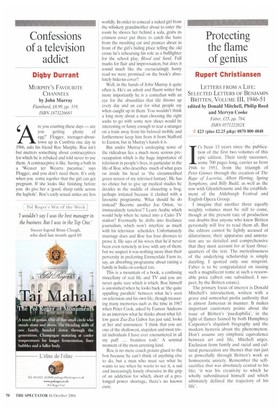Confessions of a television addict
Digby Durrant
MURPHY'S FAVOURITE CHANNELS by John Murray Flambard, £8.99, pp. 319, ISBN 1873226683
re you courting these days — are you getting plenty of egg?' Flogger, teenager-abouttown up in Cumbria one day in 1966, asks his friend Roe Murphy. Roe isn't but mutters something about contraceptives for which he is rebuked and told never to use them. A contraceptive is like having a bath in a 'Weaver ter Wearra pacamac,' says Flogger, and you don't need them. It's only when you come together that the girl can get pregnant. If she looks like finishing before you do give her a 'good, sharp rattle across the lughole'. Roe's early sexual antics are less
A worldly. In order to conceal a naked girl from the whiskery grandmother about to enter the room he shoves her behind a sofa, grabs its crimson cover put there to catch the hairs from the moulting cat and prances about in front of the girl's hiding place telling the old crone he's rehearsing his role as a bullfighter for the school play, Blood and Sand. Full marks for flair and improvisation, but does it sound much like the excruciatingly funny read we were promised on the book's absolutely hideous cover?
Well, in the hands of John Murray it quite often is. He's an adroit and fluent writer but more importantly he is a comedian with an eye for the absurdities that life throws up every day and an ear for what people say when caught up in them. You wouldn't think a long story about a man choosing the right socks to go with some new shoes would be interesting or funny enough to tear a stranger on a train away from his beloved mobile and furthermore keep him from it from Stafford to Euston, but in Murray's hands it is.
But under Murray's unsleeping sense of the ridiculous lies a much more serious preoccupation which is the huge importance of television in people's lives, in particular in the life of Roe, who describes much of what goes on inside his head as 'the circumscribed green screen of my televised fantasy'. He has no choice but to give up medical studies he decides in the middle of dissecting a frog, perhaps irritated because it clashed with a favourite programme. What should he do instead? Become another Joe Orton, 'so immaculately tasteless'? Learn Arabic which would help when he tuned into a Cairo TV station? Eventually he drifts into freelance journalism, which won't interfere as much with his television schedules. Unfortunately marriage does and Roe has four divorces to prove it. He says of his wives that he'd never been even remotely in love with any of them, but we suspect it was nothing more than their perversity in preferring Emmerdale Farm to, say, an absorbing programme about raising a family in India on cooked rats.
This is a mountain of a book, a confusing miscellany of real life and TV and you are never quite sure which is which. Roe himself is astonished when he looks back at 'the quite appalling parallels' between what he's seen on television and his own life, though treasuring many memories such as the time in 1967 when Peter Cook, asked by Eamon Andrews in an interview what he thinks about what fellow guest Zsa-Zsa Gabor has just said, looks at her and announces: '1 think that you are one of the shallowest, stupidest and most trivial individuals I have ever encountered in all my puff .... brainless tosh! A seminal moment of the most arresting kind.
Roe is no mere couch potato glued to the box because he can't think of anything else to do, but a man who must see what he wants to see when he wants to see it, a sad and increasingly lonely obsessive in the grip of an addiction for which, short of a prolonged power shortage, there's no known cure.










































































































 Previous page
Previous page